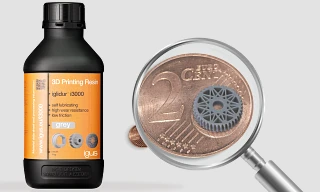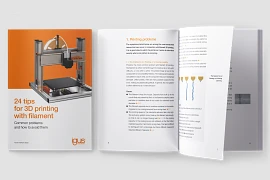Change Language :
Wear-resistant 3D printing plastics for components in moving applications

Our 3D printing materials are up to 50 times more abrasion-resistant than conventional plastics. This makes them the ideal material wherever components come into contact with movement. On this page you can find out which materials fulfil special requirements such as food conformity or ESD suitability.
In our shop you will find detailed technical information and processing instructions for all our 3D printing materials. To help you process our filaments on standard 3D printers from Bambu Lab, Prusa and Ultimaker, you can also download material profiles.⯈To the material shop
What do the iglidur plastics have in common?
All iglidur materials contain the same base materials developed specifically for plain bearings. This means that they are all self-lubricating and wear-resistant thanks to integrated solid lubricants. Take a look at the plain bearing wiki for more details.
All-rounder materials

The iglidur 3D printing materials, which can be used under normal conditions for any type of wear application, are considered all-rounders.
Bestsellers are the laser sintering powder iglidur i3 and the tribofilament iglidur i150.
If, on the other hand, an all-rounder material with significantly higher flexural strength and/or temperature resistance is required, iglidur i230 is the right material for your application.
Heat-resistant materials

This category includes 3D printing materials that can withstand a permanent application temperature of at least 120°C (without deforming): For such higher application temperatures, we offer wear-resistant tribofilaments and laser sintering powders.
What needs to be considered when processing heat-resistant tribofilaments?
- To process high-temperature filaments, you need a 3D printer with a build chamber temperature of at least 160°C.
- It is particularly important to store the high-temperature filaments protected from moisture and to dry them before use in order to avoid undesirable quality problems.
Materials that are suitable for ESD
Chemical-resistant materials

With iglidur i10, a chemical-resistant laser sintering material was developed that is characterised by high ductility and low moisture absorption. This makes it an ideal material for weight-saving functional components with elastic specifications, especially for applications in the electroplating industry. Due to its food conformity, iglidur i10 is also relevant for applications in the packaging and food industry.
You can find the chemical resistance of the individual materials by selecting "Technical data" in the material shop or "More information" for the respective material in the 3D printing service tool.
The plastics are tested for resistance to the respective chemicals. Mixtures are not taken into account. All details refer to room temperature. The resistance of the plastics is divided into resistant (+), conditionally resistant (0) and non-resistant (-).
Food-safe materials

Our 3D printing materials also include some with food conformity for safe use in the food and packaging industry. Food conformity guarantees that materials that come into contact with food have been tested for the level of transferred plastic components. EU Regulation 10/2011 and the FDA in the USA stipulate limit values for this, above which the material is no longer food-safe. The permitted contact time also plays a role and varies depending on the FDA or EU 10/2011 declaration of conformity and ambient temperature.
Tips for 3D printing with food-safe tribofilaments:
- Protect food-compliant filament from dust
- Thoroughly clean all contact parts before printing, especially the extruder pinion, print nozzle and print bed
- Do not use any adhesive or use food-grade adhesive
- Select slicing software settings for a dense surface
- Reduce the printing speed and adjust the line width to the nozzle diameter
Materials for structural components and multi-material printing
Resin for DLP 3D printing

The iglidur i3000 3D printing resin particularly stands out from conventional resins due to its enormous wear resistance and maximum strength.
Thanks to the integrated solid lubricants, it is self-lubricating and is particularly suitable for the production of gears and wear-resistant parts with the finest details.
Like the other igus 3D printing materials, the resin is processed to order in the in-house 3D printing service. It is also available as a material in the shop.
Download tips on filament 3D printing and print profiles

3D printing tips
No more stringing, warping and spaghetti - with our 24 tips you can easily avoid common problems with filament printing.
Download here
Filament printing profiles
For optimum processing of the igus filaments, we offer the material profiles for selected printer models for download.
Learn moreInformation on the in-house materials test laboratory and printing service

Tested!
3D printing materials made of iglidur compared to PLA, ABS and other materials and manufacturing processes.
To the test results
3D printing service
Customised additively manufactured components in just a few steps with the online 3D printing service.
To the igus® 3D printing serviceConsulting
I look forward to answering your questions

Shipping and consultation
In person:
Monday to Friday from 7 am - 8 pm.
Saturdays from 8 am- 12 pm.
Online:
24h
WhatsApp-Service:
Montag – Freitag: 8 – 16 Uhr















